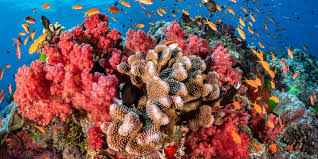Table of Contents
ToggleThe Importance of Coral Reefs
Coral reefs are among the most vibrant and diverse ecosystems on Earth. These underwater structures, formed by tiny organisms called coral polyps, support an incredible variety of marine life. Coral reefs cover less than 1% of the ocean floor but house approximately 25% of all marine species. This biodiversity is crucial for maintaining the health and balance of the oceanic ecosystem.
RELATED: Mushroom Magic: Fungi Could Help Clean Up Oil Spills!
Ecological Benefits of Coral Reefs
Coral reefs provide numerous ecological benefits:
- Habitat for Marine Life: Reefs offer shelter and breeding grounds for countless species of fish, invertebrates, and other marine organisms.
- Coastal Protection: Reefs act as natural barriers, protecting shorelines from erosion and storm surges.
- Carbon Sequestration: Coral reefs play a role in carbon sequestration, helping to mitigate climate change by absorbing carbon dioxide from the atmosphere.
Economic and Social Value
Beyond their ecological significance, coral reefs have substantial economic and social value:
- Tourism: Reefs attract millions of tourists annually, contributing significantly to local economies through diving, snorkeling, and other recreational activities.
- Fisheries: Coral reefs support commercial and subsistence fishing, providing food and livelihoods for millions of people worldwide.
- Medicinal Resources: Many marine species found in reefs have potential medicinal properties, offering prospects for new pharmaceuticals.
Threats to Coral Reefs
Despite their importance, coral reefs face numerous threats:
- Climate Change: Rising sea temperatures cause coral bleaching, where corals expel the algae living in their tissues, leading to their death.
- Ocean Acidification: Increased CO2 levels lower ocean pH, weakening coral skeletons and hindering growth.
- Pollution: Runoff from agriculture, sewage, and plastic waste damages coral health and disrupts the marine environment.
- Overfishing: Unsustainable fishing practices deplete reef species, disturbing the ecological balance.
- Destructive Activities: Coastal development, dredging, and anchor damage physically destroy coral structures.
How We Can Protect Coral Reefs
Protecting coral reefs requires collective efforts and sustainable practices:
- Reducing Carbon Footprint: Mitigating climate change by reducing greenhouse gas emissions is crucial. Opt for renewable energy sources, reduce energy consumption, and support policies aimed at climate action.
- Sustainable Tourism: Practice responsible tourism by choosing eco-friendly operators, avoiding contact with reefs, and not purchasing coral products.
- Marine Protected Areas (MPAs): Establishing and enforcing MPAs helps conserve critical reef habitats and allows ecosystems to recover.
- Pollution Control: Reducing plastic use, improving waste management, and implementing agricultural practices that minimize runoff can significantly reduce pollution.
- Restoration Projects: Supporting and participating in coral restoration projects can help rehabilitate damaged reefs and promote biodiversity.
Innovative Conservation Efforts
Innovative approaches are being developed to protect and restore coral reefs:
- Coral Gardening: Growing coral fragments in nurseries and transplanting them to damaged areas helps speed up reef recovery.
- Assisted Evolution: Researchers are exploring ways to enhance coral resilience through selective breeding and genetic modification.
- Citizen Science: Involving local communities and divers in monitoring and conservation efforts increases awareness and data collection for reef protection.
Conclusion
Coral reefs are vital to the health of our oceans and the well-being of millions of people worldwide. Understanding their importance and the threats they face is the first step towards effective conservation. By taking action to reduce our environmental impact and support sustainable practices, we can help preserve these magnificent ecosystems for future generations.



